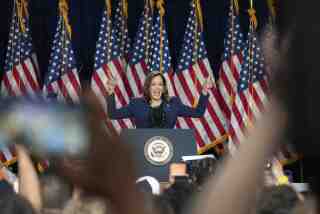Wisconsin is way station in the delegate pursuit
Wisconsin has a long and storied political history as social laboratory and presidential proving ground. But this year, the state may be little more than a stopover en route to bigger, more consequential contests early next month in Texas and Ohio.
Democratic Sen. Barack Obama, a next-door neighbor from Illinois, hopes to notch victories today in Wisconsin as well as Hawaii, extending his winning streak to 10 contests since Feb. 5.
Sen. Hillary Rodham Clinton of New York is buoyed by recent polls suggesting that victory in Wisconsin -- or at least a face-saving finish -- is within reach, offering her a chance to brake Obama’s momentum.
But it seems unlikely that Wisconsin will play the role it did in 1960 -- when a primary victory dramatically boosted John F. Kennedy’s presidential bid -- or 2004, when a defeat chased Howard Dean from the Democratic race.
With 74 delegates at stake, Wisconsin is one of the biggest states remaining in the nominating season, which ends in June.
It also offers Democrats one of their more level playing fields: Obama could benefit from the large student population and a system that encourages crossover voting among independents and Republicans; Clinton may get a lift from the state’s large white working-class population.
“We’re a wide-open state,” said Georgia Duerst-Lahti, a political scientist at Beloit College in Beloit, Wis.
Despite that, the two candidates have treated Wisconsin as something of an afterthought over the last week, dipping in and out between trips to Texas and Ohio, which vote March 4. Many observers see those two states as more likely to tip the Democratic fight because of their large, diverse populations and a combined 334 delegates.
The Republican contest in Wisconsin has stirred even less notice outside the state. Sen. John McCain of Arizona continues to face an unyielding challenge from former Arkansas Gov. Mike Huckabee. Still, McCain is favored to win Wisconsin, as well as today’s primary in Washington state, increasing his significant advantage in the delegate count.
Wisconsin has one of the most open balloting systems in the country, one of the legacies of Robert “Fighting Bob” La Follette, a former governor and senator and leader of the Progressive movement.
The state has same-day registration, and candidates of both parties are listed on one ballot, just as they will be in November. That could encourage Republicans to vote in the Democratic race, which appears less settled than theirs.
But analysts cautioned against reading too much into the results.
“People are very transactional,” said Paul Maslin, a Democratic pollster in Madison, Wis. “Some won’t vote in the primary. Some will stick with their party. Others may figure, ‘McCain doesn’t need my vote, so I’ll vote for Obama now and then take another look and decide what to do in November.’ ”
If there is any consolation for Wisconsin voters, it may be this: The state will be high on the target list for both parties in the fall.
Although Democrats have carried the state in the last five presidential contests, the last two elections have been hairbreadth close: Al Gore won it 47.8% to 47.6% in 2000, and John F. Kerry carried it 49.7% to 49.3% in 2004.
Said Marquette University analyst John McAdams: “Odds are, come November, Wisconsin will be a tossup again.”
--
(BEGIN TEXT OF INFOBOX)
State profile
Wisconsin is holding its presidential primary today. In the 2004 presidential general election, about 77% of Wisconsin’s voting-age citizens cast a ballot, one of the highest turnouts in the nation.
2004 results (by county)
[- Please see microfilm for full map information]
Electoral votes, 2008
Wisconsin: 10
Income/housing
Median household income
Wisconsin: $48,772
U.S.: $48,451
Median home value
Wisconsin: $163,500
U.S.: $185,200
Population
Wisconsin: 5.6 million
U.S.: 303 million
*--* Wisconsin U.S. Male: 49.6% 49.2%
Female: 50.4 50.8 *--*
Rank by population: 20
Median age
Wisconsin: 37.7
U.S.: 36.4
Race/ethnicity
*--* Wisconsin U.S. White 88% 74%
Black 6 12
Asian 2 4
Latino* 5 15 *--*
Education
*--* Wisconsin U.S. High school graduate or higher 88% 84% Bachelor’s degree or higher 25 27 *--*
*Latino may be of any race.
Source: U.S. Census Bureau. Graphics reporting by Nona Yates
More to Read
Sign up for Essential California
The most important California stories and recommendations in your inbox every morning.
You may occasionally receive promotional content from the Los Angeles Times.











